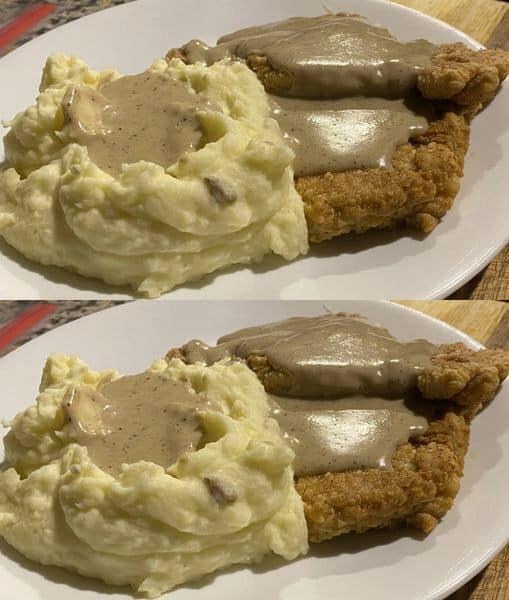ADVERTISEMENT
# Unveiling the Secret: Why You Shouldn’t Boil Mashed Potatoes and the Best Method to Make Them
Potatoes are one of the most beloved and versatile foods in the world, gracing tables in many different forms. From baked potatoes to potato salads and fries, the humble spud has secured a place in kitchens around the globe. One of the most common and comforting ways to prepare potatoes is by making mashed potatoes. But what if we told you that you might be making your mashed potatoes the wrong way? In fact, many people unknowingly make a common mistake when preparing mashed potatoes—boiling them.
Though boiling seems like the most straightforward method, it might not be the best for achieving the creamy, fluffy mashed potatoes that are so universally adored. In this article, we’ll reveal why you shouldn’t boil your mashed potatoes and share the best methods for making them perfectly every time. Whether you’re preparing mashed potatoes for a holiday feast, a casual dinner, or a special occasion, learning the right technique will elevate your dish to a whole new level. Let’s dive into this secret and uncover the science behind making the perfect mashed potatoes.
## The Common Mistake: Boiling Potatoes for Mashed Potatoes
Boiling potatoes for mashed potatoes is so common that many people don’t even think twice about it. It’s ingrained in most home cooking traditions, and countless recipes suggest placing potatoes into a pot of water, bringing it to a boil, and then mashing them once they’re soft. But, unbeknownst to many, this method may not be the best option if you want perfectly smooth and creamy mashed potatoes.
### The Science Behind Boiling Potatoes
To understand why boiling potatoes may not be ideal, let’s look at the science behind how potatoes cook. Potatoes are made up of starches, water, and cellulose. When you boil them, the water seeps into the cells of the potato, breaking down the starches and making them softer. While this may sound like the perfect approach for mashing, there’s a crucial downside.
Boiling potatoes causes the starch molecules to absorb water, which in turn makes the potatoes more watery. While this isn’t necessarily a problem when making mashed potatoes, the excess moisture can lead to a gluey, gummy texture when mashed. For the creamy, fluffy consistency we all desire, we want to limit the amount of water the potatoes absorb. Excess moisture, paired with over-mashing, can create an undesirable texture that’s heavy and pasty.
Furthermore, when boiling potatoes, some people cut them into small chunks before cooking them. While this reduces cooking time, it also increases the surface area of the potatoes, which allows even more water to be absorbed. This is why many mashed potato recipes that recommend boiling often add a significant amount of butter, cream, or milk to compensate for the water absorbed by the potatoes during boiling.
### Why Boiling Is Not Ideal
1. **Excess Water Absorption**: Boiling potatoes causes them to absorb too much water, leading to a soggy texture.
2. **Gluey Texture**: Over-mashing boiled potatoes can cause them to become sticky and gummy, especially if they’ve absorbed too much water.
3. **Loss of Flavors**: When potatoes are boiled, the flavors can become diluted. Some of the natural potato flavors are lost to the water, leaving the final dish lacking in depth.
4. **Longer Cooking Time**: Boiling potatoes can take a bit longer than other methods, especially if you’re using large, whole potatoes.
## The Best Method: Steaming Potatoes for Mashed Potatoes
Now that we’ve explored the issues with boiling, let’s uncover the best way to make mashed potatoes: **steaming**. Steaming potatoes offers a range of benefits that boiling simply can’t match, and it’s a far superior method for creating mashed potatoes that are creamy, fluffy, and full of flavor.
### Why Steaming Is the Best Option
Steaming potatoes, as opposed to boiling them, allows for better moisture control. Here’s why steaming is the ideal method for mashed potatoes:
1. **Less Water Absorption**: When you steam potatoes, they cook with steam, which means they don’t absorb as much water. This results in a drier potato, which makes for better mashed potatoes.
2. **Creamier Texture**: Since the potatoes don’t absorb excess water, they have a more solid structure, making them easier to mash into a smooth, creamy texture.
3. **Better Flavor**: Steaming preserves the natural flavors of the potatoes better than boiling, because the flavors aren’t diluted by water.
4. **Control Over Moisture**: Steaming allows for greater control over the amount of moisture in the potatoes, making it easier to add butter, cream, or milk in small increments until you reach the perfect consistency.
For Complete Cooking STEPS Please Head On Over To Next Page Or Open button (>) and don’t forget to SHARE with your Facebook friends
